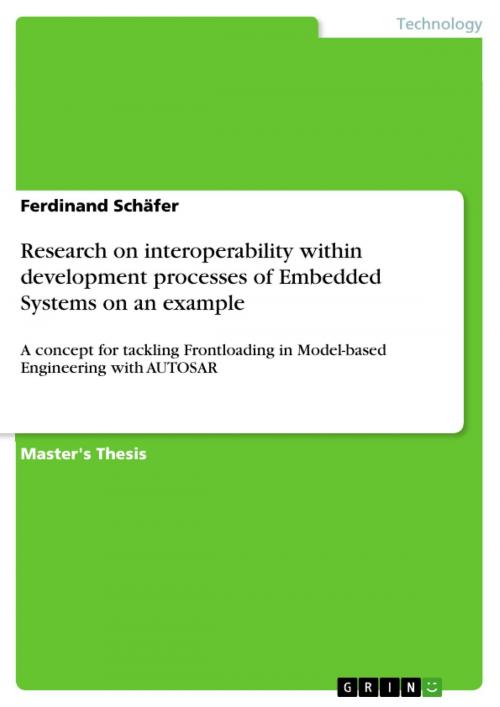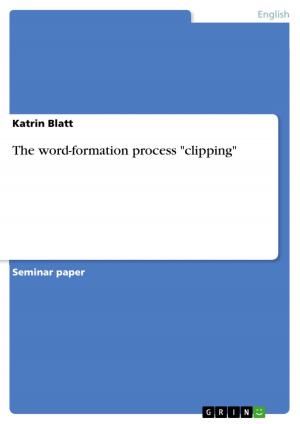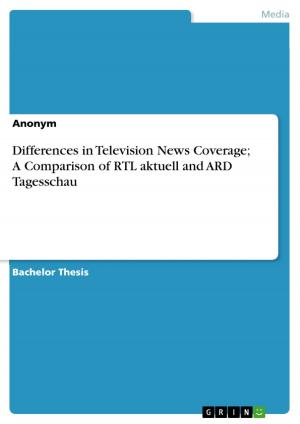Research on interoperability within development processes of Embedded Systems on an example
A concept for tackling Frontloading in Model-based Engineering with AUTOSAR
Nonfiction, Science & Nature, Technology, Machinery| Author: | Ferdinand Schäfer | ISBN: | 9783656897965 |
| Publisher: | GRIN Publishing | Publication: | February 16, 2015 |
| Imprint: | GRIN Publishing | Language: | English |
| Author: | Ferdinand Schäfer |
| ISBN: | 9783656897965 |
| Publisher: | GRIN Publishing |
| Publication: | February 16, 2015 |
| Imprint: | GRIN Publishing |
| Language: | English |
Master's Thesis from the year 2014 in the subject Engineering - Mechanical Engineering, grade: 1.0, University of Applied Sciences Karlsruhe (Fakultät für Maschinenbau und Mechatronik), language: English, abstract: This master thesis investigates the standard AUTOSAR ('AUTomotive Open System ARchitecture') within the ARTEMIS Joint Undertaking project CRYSTAL ('CRitical sYSTem engineering AcceLeration'), which is concerned with the development of interoperability-technology for System Engineering Environments. This work identifies a conflict between the application of the development-scheme 'AUTOSAR-Methodology' and the superior industrial trend of Model-based Software Engineering. Founded on specialized literature, the mentioned problem can be titled as 'Frontloading'. This methodological issue is such a fundamental aspect for the utilization of AUTOSAR that the present elaboration concentrates on it and refrains from interoperability-technology as focused by the paramount project. In the light of the motivation indicated in the acronym of CRYSTAL, clarifying this methodological aspect constitutes a fundamental contribution to efficiency in the engineering of Embedded Systems. This master thesis elucidates in detail the phenomenon 'Frontloading' and its symptoms in software-development with AUTOSAR. The elaboration is based on a rich automotive function-example, which is developed in accordance with the established paradigm of Model-based Software Engineering. Although AUTOSAR adheres to the latter, its application demands own specific procedures to produce automotive functions. This work finally delivers a concept for the efficient handling of AUTOSAR within Model-based Software Engineering with respect to Frontloading, associating requirements to corresponding development-artefacts.
Master's Thesis from the year 2014 in the subject Engineering - Mechanical Engineering, grade: 1.0, University of Applied Sciences Karlsruhe (Fakultät für Maschinenbau und Mechatronik), language: English, abstract: This master thesis investigates the standard AUTOSAR ('AUTomotive Open System ARchitecture') within the ARTEMIS Joint Undertaking project CRYSTAL ('CRitical sYSTem engineering AcceLeration'), which is concerned with the development of interoperability-technology for System Engineering Environments. This work identifies a conflict between the application of the development-scheme 'AUTOSAR-Methodology' and the superior industrial trend of Model-based Software Engineering. Founded on specialized literature, the mentioned problem can be titled as 'Frontloading'. This methodological issue is such a fundamental aspect for the utilization of AUTOSAR that the present elaboration concentrates on it and refrains from interoperability-technology as focused by the paramount project. In the light of the motivation indicated in the acronym of CRYSTAL, clarifying this methodological aspect constitutes a fundamental contribution to efficiency in the engineering of Embedded Systems. This master thesis elucidates in detail the phenomenon 'Frontloading' and its symptoms in software-development with AUTOSAR. The elaboration is based on a rich automotive function-example, which is developed in accordance with the established paradigm of Model-based Software Engineering. Although AUTOSAR adheres to the latter, its application demands own specific procedures to produce automotive functions. This work finally delivers a concept for the efficient handling of AUTOSAR within Model-based Software Engineering with respect to Frontloading, associating requirements to corresponding development-artefacts.















